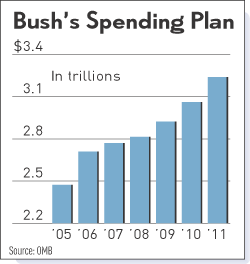Government Spending: Politicians, as we know, sometimes have trouble being honest. Nowhere is this more in evidence than in how they use the term "cuts" in discussing the federal budget.
As noted here Tuesday, President Bush's new budget slows the growth of spending, but doesn't reverse it. Yet, listening to media pundits and even members of Bush's own party, you'd think spending was being slashed. It's not.
Sen. Arlen Specter, for example, decried Bush's proposed reductions for education and health as "scandalous." Another Republican — Maine's Olympia Snowe — said she was "disappointed, even surprised" by "cuts" in Medicaid and Medicare.
Among the media, CBS correspondent David Axelrod was perhaps typical. Using five-year budget forecasts, he recited the following misleading litany: "Education, cut 28%; Housing and Urban Development, cut 30%" and "$36 billion in Medicare cuts over the next five years."
In the fevered swamp that is Washington, rhetoric rarely matches reality. It's fair to say this budget isn't quite what critics say.
Federal spending, in fact, will increase this year by 2.3% to $2.77 trillion — capping a 43% surge since fiscal 2001. By 2011, the budget will be 20% bigger, at $3.24 trillion. Meanwhile, a lot of what some call "cuts" aren't cuts at all.
Take Medicare. Is Bush's request really $36 billion lower than this year's allocation? No. Under Bush's plan, Medicare will grow 66% from 2005's $294 billion to $489 billion in 2011.
As for those "cuts" in Medicaid, well, spending is set to climb 44% to $270 billion.
OK, you say, but what about education? Here, CBS' Axelrod has a point — in a way. Education spending will go from $56.5 billion in the 2006 budget to $54.4 billion in 2007 — a drop of 3.8%. It will also fall over the next five years.
Seems a little tightfisted until you realize that education spending in 2007, even after the 3.8% cut, will be nearly 36% higher than it was in 2001. That comes out to an average annual gain of 6% — the biggest sustained rise in education spending in U.S. history.
Bush does plan to cut or kill 141 government programs — many in education — that simply don't work. For this, he should be applauded, not cursed. Why waste money?
Truth is, after a spending binge, Bush is finally deferring to critics and holding down spending to shrink the deficit. If all goes as planned, red ink will shrink from 3.2% of GDP in 2005 to 1.2% in 2011. The average over the last 40 years has been 2.3%.

We're not fans of big government. Never have been. And sure, one of these days we'd like to see some cuts deserving of the name. Short of that, what the president has proposed sounds like progress.
No comments:
Post a Comment